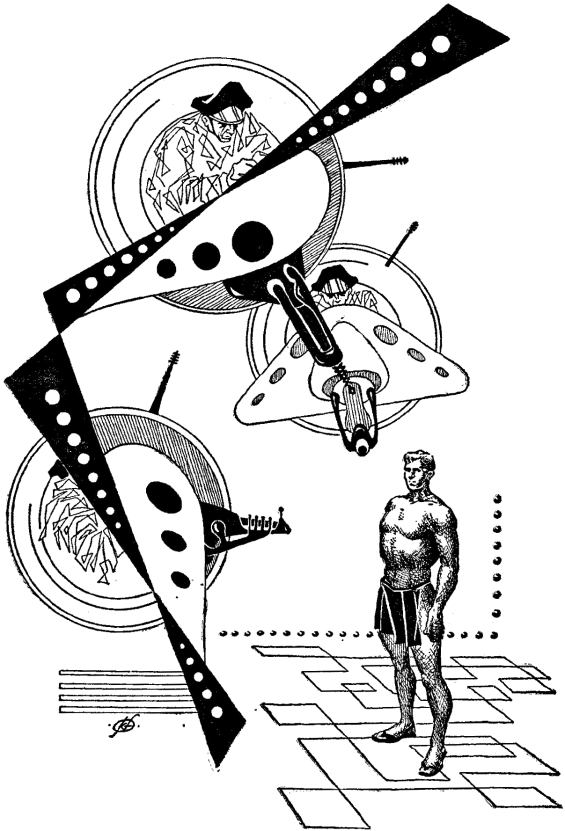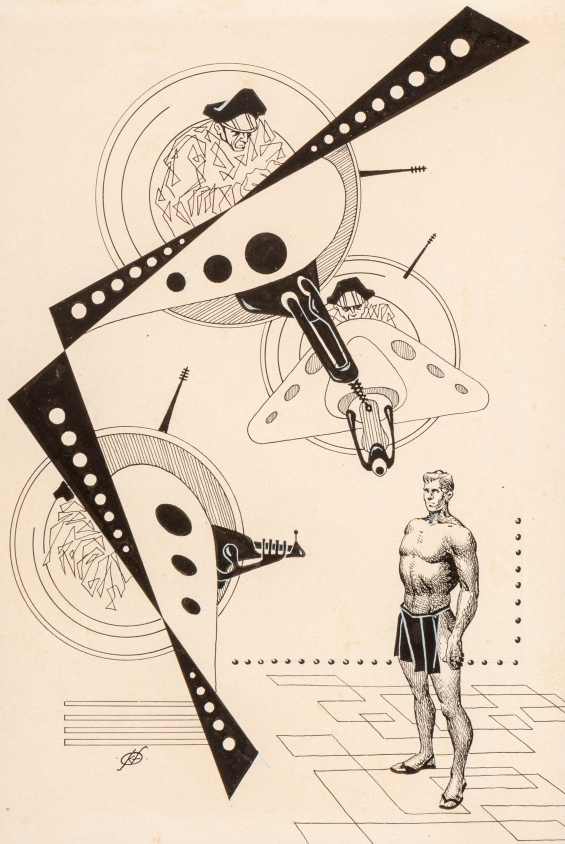
 The SFFaudio Podcast #316 – The Golden Man by Philip K. Dick; read by Mike Vendetti. This is an unabridged reading of the story (1 hour 15 minutes) followed by a discussion of it. Participants in the discussion include Jesse, Tamahome, Paul, and Mike.
The SFFaudio Podcast #316 – The Golden Man by Philip K. Dick; read by Mike Vendetti. This is an unabridged reading of the story (1 hour 15 minutes) followed by a discussion of it. Participants in the discussion include Jesse, Tamahome, Paul, and Mike.
Talked about on today’s show:
1954, The God Who Runs, bad titles, Next, Homo Aureus, The Man In The high Castle (TV series), hashtag marketing, an episode of The Twilight Zone, the film adaptation, Knowing, a working train-wreck, the main character has no sapience, autism, the diner scene, not just an exposition scene, the fake salesman, a lady with 8 boobs, shades of Total Recall, he’s looking for Jews, the secret police, the DCA are the secret police, the locals protect the mutant, Philip K. Dick:
“Here I am saying that mutants are dangerous to us ordinaries, a view which John W. Campbell, Jr. deplored. We were supposed to view them as our leaders. But I always felt uneasy as to how they would view us. I mean, maybe they wouldn’t want to lead us. Maybe from their super-evolved lofty level we wouldn’t seem worth leading. Anyhow, even if they agreed to lead us, I felt uneasy as where we would wind up going. It might have something to do with buildings marked SHOWERS but which really weren’t.”
what we did to the neanderthals, this is super X-Men, the John W. Campbell mutants vs. the Philip K. Dick mutants, House Of M, for those who are not Tamahome…, Spider-Man trying to “pass” as a mutant, the Scarlet Witch can re-write reality, to the beginnings of the superhuman genre, the origins of Superman, powerful superheroes are going to save us, Astounding -> Analog, John W. Campbell was obsesses with psychic powers being a science, mutation as evolution up, Slan by A.E. van Vogt, “fans are slans”, a lot of stuff going on, looking into the future, this so isn’t a movie, they just put a golden tint on the film-stock for Next, single word titles, Audible ratings, a story that is repulsive to everybody, we are the monsters, Audible’s return policy, Mike grew up in the Cold War era, Mutual Assured Destruction, no real external threat anymore, the Soviets have their own DCA, all the “deves” are getting “euthed”, Cris Johnson is the character’s name in the book and the movie, Dick was really interested in what happened in Nazi Germany, the atomic war caused all these mutations, the diner scene again, they’re everywhere!, the Johnson family seem to love Cris, he’s got the James Bond gene, women can’t resist, the unfaithful wives (and husbands), the crappy Wikipedia summary, can they sterilize everybody, they know this is the end, Cris can never be outmaneuvered, the whole last 40 minutes of Next didn’t happen, the movie does a good job of illustrating how Cris’ super-power would work, Groundhog Day, computer save gaming, because Cris can’t talk…, how we interact with NPCs in computer games is how Cris is interacting with everyone around him, we’re all sort of trapped like that, marketing it as a X-Men or superhero type story, imaging a dollhouse and all the different possibilities he could do, Philip K. Dick is Mr. Innovative, a chilling world that’s pretty much like ours, a very ’50s feel in terms of the country and random energy shields, the X-Men explanation for mutation (atomic bomb testing), The Crawlers by Philip K. Dick, the golden man is beautiful and the crawlers are ugly, the crawlers have their own agenda, they are not seen as human, Harlan Ellison, a mutant psionic, The Skull by Philip K. Dick, “we met the enemy and he is us”, the mutant theme has dried up in SF, Deus Irae, an armless and legless hero, Tibor McMasters, a huge sense of pathos, “how come people are such assholes”, The Turning Wheel by Philip K. Dick, White Man’s Burden, what if we would have lost the war (WWII)?, Cañon City, Colorado, Mike is the man in The Man In The high Castle again, Nazis vs. Imperial Japan, the American occupation of Japan, Two Dooms by C.M. Kornbluth, occultist, even more surreal than Dick, we’re number 1 and their number 10, the werewolves (post-war German resistance against occupation), going to the movies, after the atom bomb, you never saw the Hollywood movie where the Americans invade Russia (the reverse of Red Dawn), the ridiculous premise behind the remake of Red Dawn, North Korea, auto-immune disease, the acronym-itis that sinks the ship, government conspiracies, aliens, Mexicans are aliens?, what?, what would happen if the Americans left California, don’t spread that rumor, Pacific Edge, the California drought, Washington and Oregon, archetypical Dick, A Canticle For Leibowitz by Walter M. Miller, to quote Solaris, Dick is wise, if humans go on as Cris Johnson, this is why people are upset that their kids are autistic, he is in a sense “superior”, ok you say you want a superior being… how do you like that John W. Campbell, he’s a golden god, the Steve McQueen of mutants, a swelling torrent of sheer force!, are they having sex?, cigarettes as symbols, explicit sex, a seduction, is she going to be the mother of dragons?, Genghis Khan style, Cris is unique (for now), dumb feral cubs, dominant or recessive, there is no hope, it won’t be us, grinning wryly, In The Mouth Of Madness, every species can smell its distinction, man will be a myth, one perfectly adapted animal, more of a threat to the men than it is to the women, Species, a female golden man, that’s why you have the mutants with the eight breasts, what do you think of that? what do ya make of this?, a litter of kids needs eight arms, turning people into animals, rats, subhumans, what do ya make of that?, he’s covered in fur, how does he put on pants?, he’s like a peacock, Hyperpilosity by L. Sprague de Camp, why peahens choose peacocks with the longest tails, peahens want their male offspring to be attractive to peahens, they’re going to breed us out of business, The Turning Wheel (again), racism, H.P. Lovecraft, it’s an act!, there are mutants all around them, he’s one thing in the restaurant he’s another to the cop, a super-secret agency that everybody knows about and talks about, every family is hiding a mutant, FBI agents infiltrating anarchists groups, ATF Operation Fearless, Kafka by way of Dick, the NRA, welcome to America, Anita, sexism, nobody is clean in this fight, Cris ruins the horseshoe game (by way of saying goodbye?), a repulsive attractive powerful story, Cris’ mom, Cris’ dad, how could this story have been adapted otherwise, a stupid plot, why do the French want to blow up Los Angeles?, the movie is a train-wreck and yet…, Juliane Moore’s character is a monster, she’s driven, strapped to the Clockwork Orange chair watching CNN, that’s burying the lead, the two minute rule, he’s got no past, you have to have a past to decide what you’re going to do in the future, his present is our future, the movie has lots of problems, what was the “next” card, domestic rendition, there are people, don’t ask this question, Cris doesn’t need to speak because speaking is for planning, he’s just an animal, you have to have a past to plan.


Posted by Jesse Willis




 1960:
1960: 1961:
1961: